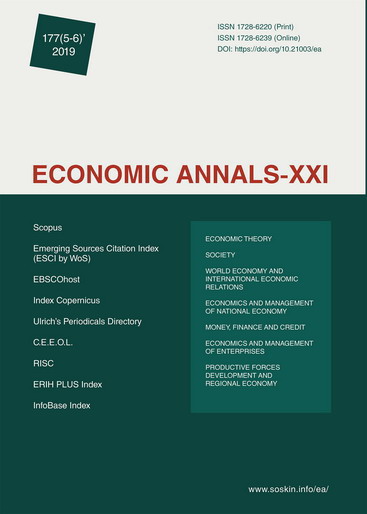Assessment of the impact of socio-economic factors on productivity increase
Assessment of the impact of socio-economic factors on productivity increase
Author(s): Julia Steshenko, Aleksei Artemyev, Talgat Myktybaev, Inna Khavanova, Andrei Masterov, Marina PonomarevaSubject(s): National Economy, Socio-Economic Research
Published by: Institute of Society Transformation
Keywords: Productivity; Tax Burden; Tax Incentives; Econometric Model; R&D; Gross Domestic Product (GDP); Russia; EAEU;
Summary/Abstract: Stimulation of productivity increase is a key task at the present stage of development of the economies of both Russia and Eurasian countries. The purpose of this article is to identify quantitative assessments of how various factors impact productivity increase and conduct a cluster analysis of the regions, based on the considered indicators that evaluate the impact of relevant factors on productivity. The authors use general scientific methods such as analysis and synthesis, econometric analysis and multidimensional statistics. To build the model, the authors of the article used statistical data relating to socio-economic development indicators for 85 Russian regions. As a result of the correlation and regression analysis, the following factors were identified: the average monthly wage, consumption of fixed capital, internal R&D costs, innovative activity of organisations, and tax burden. These factors have both positive and negative impacts on productivity. A cluster analysis was also conducted. It enabled to group the regions in terms of their productivity. Based on the analysis, the authors proposed the directions of improving the policy to increase productivity for each of the three clusters. For the regions included in the first cluster, it is necessary to apply methods of direct state regulation, for the regions of the second cluster - to pursue a policy of improvement of tax incentive mechanisms through the application of regional tax benefits and the use of special tax regimes, for the third cluster - to implement a supportive productivity policy for maintaining stable indicator values. The study highlights the key areas of tax incentives, the use of which will increase productivity and achieve the goals of economic development - stimulation of human capital development, support of R&D and development of infrastructure.It has been concluded that the tax burden negatively affects the growth of productivity. Therefore, the use of the mechanism of tax tools, such as tax benefits and preferences, can contribute to the achievement of goals of economic growth. The current economic policy should be focused on increasing the efficiency of all productive sectors, namely supporting the deployment of innovations, removing barriers to raising investment, and stimulating human capital and labour force by using the tax incentives.
Journal: Економічний часопис - ХХІ
- Issue Year: 177/2019
- Issue No: 05+06
- Page Range: 70-81
- Page Count: 12
- Language: English

